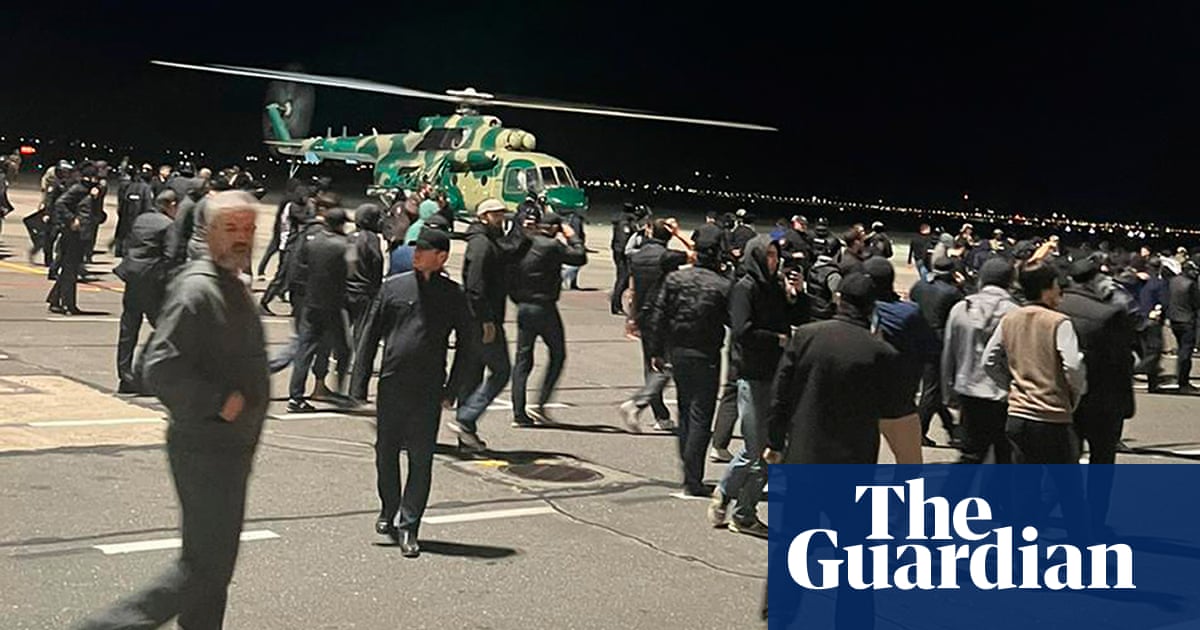
The United States has dismissed Russia’s attempt to blame Ukraine and the west for an antisemitic riot at an airport in Muslim-majority Dagestan.
President Vladimir Putin accused Ukraine and “agents of western special services” after a mob descended on Makhachkala airport in Russia’s North Caucasus on Sunday evening in search of Jewish passengers on a plane that arrived from Israel.
Maria Zakharova, the Russian foreign ministry spokesperson, said on Monday the riot was the result of a “provocation” orchestrated from outside Russia, with Ukraine playing a “direct and key role”. Earlier in the day, Dmitry Peskov, Vladimir Putin’s spokesperson, claimed the unrest was “the result of external intervention, including external information influence”.
Neither Zakharova or Peskov provided evidence to support their claims of outside interference.
Asked about the accusations against the west at a White House briefing, US National Security Council spokesman John Kirby said: “Classic Russian rhetoric, when something goes bad in your country, you blame somebody else.”
“The west had nothing to do with this. This is just hate, bigotry and intimidation, pure and simple,” Kirby said.
“Some people will compare it to the pogroms of the late 19th and early 20th century and I think that’s probably an apt description, given that video that we’ve seen out there,” he said of anti-Jewish attacks.
Kirby criticised Putin for not doing more to condemn the violence, which he described as “a chilling demonstration of hate”.
State Department spokesman Matthew Miller earlier called Russian allegations of Ukrainian involvement “absurd”.
“We call on Russian authorities to publicly condemn these violent protests, to hold anyone involved accountable and to ensure the safety of Israelis and Jews in Russia,” Miller said.
Ukraine – which Russia invaded last year – has also strongly rejected the allegations and pointed to Russia’s “deep-rooted antisemitism”.
The anti-Jewish demonstrations come against the backdrop of Putin taking a pro-Palestinian stance in Israel’s war in Gaza, a position that aligns the Kremlin with its ally Iran in what analysts have described as a growing global divide between east and west.
Last week, a senior Hamas delegation travelled to Moscow to meet Russian officials in the organisation’s first high-profile international visit since it launched a raid in southern Israel on 7 October. Israel criticised the visit, saying inviting Hamas “sends a message legitimising terrorism”.
With Agence France-Presse
https://news.google.com/rss/articles/CBMidGh0dHBzOi8vd3d3LnRoZWd1YXJkaWFuLmNvbS93b3JsZC8yMDIzL29jdC8zMS92bGFkaW1pci1wdXRpbi1jbGFpbXMtd2VzdC1iZWhpbmQtZGFnZXN0YW4tYW50aXNlbWl0aWMtcmlvdHMtdXMtZGVuaWVz0gF0aHR0cHM6Ly9hbXAudGhlZ3VhcmRpYW4uY29tL3dvcmxkLzIwMjMvb2N0LzMxL3ZsYWRpbWlyLXB1dGluLWNsYWltcy13ZXN0LWJlaGluZC1kYWdlc3Rhbi1hbnRpc2VtaXRpYy1yaW90cy11cy1kZW5pZXM?oc=5
2023-10-31 04:05:00Z
2575186998
Tidak ada komentar:
Posting Komentar